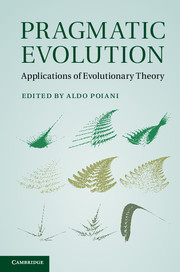Book contents
- Frontmatter
- Contents
- Contributors
- Acknowledgements
- Preface
- Introduction
- Part I Evolution, Ecology and Conservation
- Part II Evolution and Food Production
- Part III Evolution and Medicine
- Part IV Evolution and Psychology
- Part V Evolution and Computing
- Part VI Evolution and Society
- 14 Evolutionary arguments against the de facto re-pathologising of homosexuality
- 15 Teaching evolution and the nature of science
- 16 Evolutionary ideologies
- 17 Can Darwinism offer existential reassurance at times of personal or social crisis?
- Index
- Plate Section
- References
16 - Evolutionary ideologies
from Part VI - Evolution and Society
Published online by Cambridge University Press: 05 April 2012
- Frontmatter
- Contents
- Contributors
- Acknowledgements
- Preface
- Introduction
- Part I Evolution, Ecology and Conservation
- Part II Evolution and Food Production
- Part III Evolution and Medicine
- Part IV Evolution and Psychology
- Part V Evolution and Computing
- Part VI Evolution and Society
- 14 Evolutionary arguments against the de facto re-pathologising of homosexuality
- 15 Teaching evolution and the nature of science
- 16 Evolutionary ideologies
- 17 Can Darwinism offer existential reassurance at times of personal or social crisis?
- Index
- Plate Section
- References
Summary
The point I wish to explore in this chapter is scientific authority; who actually gets to speak in Darwin's name, and why it is important that we cast our nets narrowly. Evolution has meant several things to different generations of Darwinians. Most of these versions of Darwinism are recognisable in hindsight as flawed in various ways. Today, as in the past, there are diverse and conflicting Darwinisms, vying for credibility in the marketplace of ideas. The best birthday present we can give Charles Darwin, I will argue, is a clear name.
Human microevolution
Recent scholarship has shown that Darwin himself was strongly engaged with the political ideas of his age: as he was reading Lyell on the Beagle, the British were outlawing slavery in their colonies. The major evolutionary question of the era was not about dinosaurs or finches or tortoises, but about people (Livingstone, 2008; Desmond and Moore, 2009): were black people and white people the products of a single origin or creative act, or of different ones, of which the Bible only recounts the last?
- Type
- Chapter
- Information
- Pragmatic EvolutionApplications of Evolutionary Theory, pp. 297 - 312Publisher: Cambridge University PressPrint publication year: 2011



